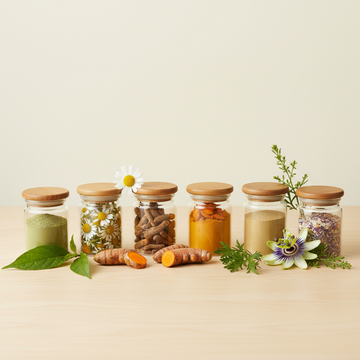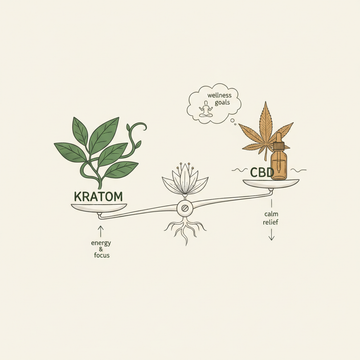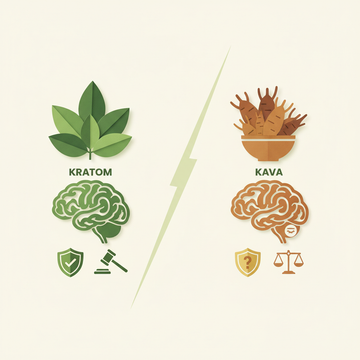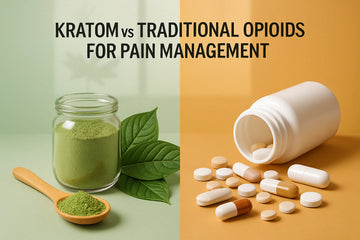The search for natural wellness alternatives has intensified across Canada in 2025, as more people explore botanical options for pain management, mood support, and stress relief. While kratom has gained attention for its potential benefits, many Canadians are seeking legally available, well-researched herbal substitutes that align with Health Canada regulations. The good news? Several plant-based alternatives offer similar therapeutic potential with established safety profiles and scientific backing.
If you're asking whether effective natural alternatives to kratom exist, the short answer is yes – multiple botanical options can address pain, mood, and energy concerns through different mechanisms. From turmeric's anti-inflammatory properties to ashwagandha's stress-reducing effects, these alternatives provide targeted support while meeting Canadian regulatory standards. Understanding these options helps you make informed decisions about your wellness journey.
Plant-Based Alternatives for Pain Management
When exploring herbal kratom substitutes for pain relief, several botanicals stand out for their evidence-based effectiveness and safety profiles. These natural pain relief alternatives work through various mechanisms, from reducing inflammation to modulating pain perception.
Turmeric and Curcumin: Anti-inflammatory Powerhouse
Turmeric represents one of the most researched botanical remedies for pain Canada, particularly for inflammatory conditions. A 2021 Canadian clinical review found that curcumin reduced osteoarthritis pain scores by 50% in patients after 8 weeks, highlighting its significant therapeutic potential. The active compound curcumin blocks inflammatory pathways that contribute to pain, making it especially effective for arthritis, joint pain, and muscle soreness.
The key to turmeric's effectiveness lies in bioavailability. Combining curcumin with black pepper extract (piperine) increases absorption by up to 2000%. Many Canadians find relief with standardized curcumin extracts containing 95% curcuminoids, taken with meals to minimize stomach irritation.
Willow Bark: Nature's Original Aspirin
Often called "nature's aspirin," willow bark offers a traditional approach to pain management. Willow bark extract contains salicin, used for centuries in Europe for pain; a 2022 review confirmed it may moderately reduce low-back pain compared to placebo. This botanical pain reliever works similarly to aspirin but typically causes fewer stomach issues.
Willow bark proves particularly effective for headaches, lower back pain, and inflammatory conditions. The standard dosage ranges from 120-240mg of salicin daily, though it may take several days to reach full effectiveness. Those allergic to aspirin should avoid willow bark due to similar chemical compounds.
CBD Oil: Cannabinoid-Based Relief
CBD has emerged as a popular non-kratom anxiety support and pain management option among Canadians. In 2023, 24% of Canadian adults reported using CBD products for pain, most commonly for arthritis and back pain. Unlike THC, CBD doesn't produce psychoactive effects while potentially reducing pain and inflammation.
Health Canada regulates CBD products, ensuring quality and consistent dosing for consumers. Full-spectrum CBD oils often provide enhanced benefits through the "entourage effect," where multiple cannabis compounds work synergistically. Starting with low doses (10-25mg daily) allows users to assess tolerance and effectiveness.
Natural Mood Enhancement Options
For those seeking botanical remedies for mood support and stress management, several adaptogenic herbs and traditional botanicals offer promising alternatives to conventional approaches.
St. John's Wort: Traditional Mood Support
St. John's Wort has earned recognition as one of the most studied plant-based mood boosters. A 2022 meta-analysis found St. John's Wort was as effective as SSRIs for mild to moderate depression and better tolerated. This finding positions it as a valuable option for Canadians seeking natural mood enhancement.
The herb works by influencing neurotransmitter levels, including serotonin, dopamine, and norepinephrine. Standard extracts contain 0.3% hypericin and require 4-6 weeks for full effects. However, St. John's Wort interacts with numerous medications, including birth control pills and blood thinners, making professional consultation essential.
Rhodiola Rosea: Adaptogenic Stress Relief
As an adaptogenic herb for stress, Rhodiola rosea helps the body manage physical and mental stressors more effectively. Rhodiola extract has been shown in a 2024 Montreal trial to reduce self-reported stress by 45% after 6 weeks, demonstrating significant potential for Canadian users dealing with daily stressors.
Rhodiola works by supporting healthy cortisol levels and enhancing cellular energy production. It proves particularly beneficial for fatigue, mental fog, and stress-related mood changes. The optimal dosage typically ranges from 200-600mg daily of standardized extract containing 3% rosavins and 1% salidroside.
Ashwagandha: Comprehensive Anxiety Support
Ashwagandha stands out among holistic pain remedy options for its dual benefits addressing both stress and physical discomfort. A 2022 Canadian study showed 60% of participants reported a reduction in anxiety symptoms after 3 months of taking ashwagandha supplement. This adaptogen helps regulate the hypothalamic-pituitary-adrenal axis, reducing stress hormone production.
Beyond anxiety relief, ashwagandha may improve sleep quality, boost energy levels, and support cognitive function. The root extract, standardized to contain withanolides, typically requires 300-600mg daily for therapeutic effects. Most users notice improvements within 2-4 weeks of consistent use.
Multi-Purpose Natural Remedies
Some botanicals offer versatile benefits, addressing multiple wellness concerns simultaneously. These safe natural pain management options can serve as comprehensive alternatives for those seeking broad-spectrum support.
Kava Kava: Relaxation and Mild Pain Relief
Kava kava provides unique benefits for both relaxation and discomfort management. Kava kava is recognized by Health Canada for short-term management of mild anxiety, though use should be limited to avoid liver risks. This official recognition underscores its legitimacy while emphasizing safety considerations.
The active compounds, called kavalactones, produce calming effects without sedation, making kava suitable for daytime anxiety management. Traditional Pacific Island preparations involve aqueous extracts, which appear safer than alcohol-based extracts. Limiting use to 8-12 weeks prevents potential liver complications.
Quality and Safety Considerations
Choosing high-quality natural alternatives requires understanding Canadian regulations and safety standards. Health Canada urges consumers to check for Natural Product Numbers (NPN) to confirm product safety and quality before purchasing herbal supplements. This verification ensures products meet manufacturing and labeling standards.
Only products bearing an approved NPN or DIN-HM are legally sold and verified for safety in the Canadian market. These numbers indicate third-party testing for purity, potency, and contaminant screening. Reputable suppliers like 365 Kratom Canada maintain rigorous quality standards, ensuring their botanical products undergo comprehensive testing for safety and consistency.
Pro Tip: Look for standardized extracts with specific active compound percentages. This standardization ensures consistent potency between batches and predictable effects.
Making Informed Decisions About Natural Wellness
Successfully incorporating natural alternatives requires a thoughtful, informed approach that considers individual needs, safety factors, and realistic expectations.
Consulting Healthcare Professionals
Professional guidance becomes crucial when transitioning to or adding natural wellness options. A 2022 Ipsos survey found 59% of Canadians prefer consulting a healthcare provider prior to starting herbal supplements. This preference reflects growing awareness that natural doesn't automatically mean risk-free.
Healthcare providers can assess potential interactions with existing medications, underlying health conditions, and appropriate dosing strategies. Many family doctors now receive training in integrative medicine, making them valuable resources for combining conventional and natural approaches safely.
Understanding Individual Response Variations
Natural remedies affect people differently based on genetics, metabolism, and existing health status. Clinical studies note significant variation in individual response and side effects across herbal pain remedies, highlighting the need for personalized approaches. This variability means finding the right alternative often requires patience and systematic testing.
Starting with single botanicals rather than combinations helps identify which options work best for your specific needs. Keeping a simple journal tracking dosage, timing, and effects can reveal patterns and optimize results. Some people respond better to certain herb families or extraction methods.
Building a Sustainable Wellness Routine
Long-term success with natural alternatives often involves comprehensive lifestyle integration rather than relying solely on individual supplements. 83% of surveyed Canadian health consumers in 2024 described multi-modal approaches (herbs plus lifestyle) as most sustainable for wellness. This holistic perspective recognizes that botanicals work best as part of broader wellness strategies.
Combining herbal support with stress management techniques, regular exercise, and quality sleep creates synergistic effects. For instance, ashwagandha's stress-reducing properties enhance the benefits of meditation practice, while turmeric's anti-inflammatory effects support recovery from physical activity.
Key Insight: The most effective natural wellness routines evolve gradually. Start with one well-researched botanical, establish consistent use for 4-6 weeks to assess effects, then consider adding complementary options based on results.
Companies like 365 Kratom Canada recognize this holistic approach, offering educational resources alongside their carefully crafted botanical blends. Their Clarity and Relax formulations demonstrate how thoughtful combinations of natural ingredients can support specific wellness goals while maintaining safety and quality standards.
Frequently Asked Questions
What are the safest natural alternatives to kratom for pain relief?
Turmeric (curcumin), willow bark, and CBD oil represent the safest options with substantial research backing. All three have established safety profiles when used appropriately and don't carry the regulatory concerns associated with kratom in Canada.
How long does it take for herbal alternatives to show effects?
Most herbal remedies require 2-6 weeks for full therapeutic effects. Acute pain relievers like willow bark may work within days, while adaptogens like ashwagandha typically need 4-6 weeks of consistent use to demonstrate optimal benefits.
Can I combine multiple natural alternatives safely?
Combining botanicals requires careful consideration of potential interactions and cumulative effects. Start with single herbs to assess individual responses, then consult healthcare providers before adding multiple supplements to your routine.
Are natural alternatives legal and regulated in Canada?
Yes, when properly licensed. Look for products with Natural Product Numbers (NPN) or Drug Identification Numbers for Homeopathic Medicine (DIN-HM) to ensure compliance with Health Canada regulations and quality standards.
Which natural alternatives work best for anxiety and stress?
Ashwagandha, Rhodiola rosea, and kava kava show the strongest evidence for anxiety and stress management. Ashwagandha offers the most comprehensive research base, while Rhodiola excels for stress-related fatigue.
How do I choose quality natural products in Canada?
Verify NPN numbers, choose standardized extracts with specified active compounds, and select suppliers who provide third-party testing results. Companies like 365 Kratom Canada exemplify quality standards through comprehensive batch testing and transparency.
What should I avoid when using natural pain alternatives?
Avoid products without proper licensing, don't exceed recommended dosages, and be cautious of unrealistic marketing claims. Always inform healthcare providers about herbal supplements, especially before surgeries or when starting new medications.
Moving Forward with Natural Wellness
The landscape of natural alternatives to kratom continues expanding in 2025, offering Canadians diverse, evidence-based options for pain management, mood support, and overall wellness. From turmeric's powerful anti-inflammatory effects to ashwagandha's stress-reducing properties, these botanical remedies provide legitimate therapeutic potential when chosen and used wisely.
Success with natural alternatives requires patience, quality products, and often professional guidance. The key lies in matching specific botanicals to your individual needs while maintaining realistic expectations about timelines and effects. Remember that the most sustainable approaches typically combine targeted herbal support with comprehensive lifestyle strategies.
Whether you're seeking alternatives for pain management, mood enhancement, or general wellness support, prioritize products from reputable suppliers who emphasize quality, testing, and transparency. Companies like 365 Kratom Canada demonstrate how committed suppliers can provide reliable access to premium botanical products while supporting customer education and safety.
Ready to explore natural wellness alternatives? Start with single, well-researched botanicals that match your primary concerns, and consider consulting healthcare providers to optimize your approach. Your journey toward natural wellness deserves the foundation of quality products and informed decision-making.





